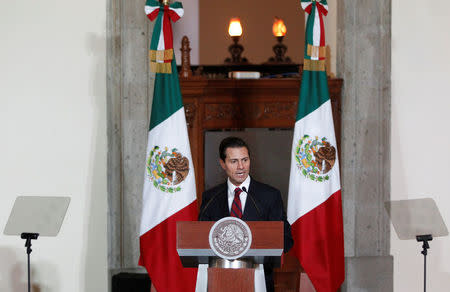Mexico says to seek broad negotiating strategy with Trump
MEXICO CITY (Reuters) - Mexico's government said on Wednesday it would throw its relationship with the United States wide open when it sits down for talks with the incoming U.S. administration, putting security, migration and trade on the table in search of a deal. U.S. President-elect Donald Trump has threatened to tear up a trade agreement that underpins Mexico's economic model if he cannot renegotiate its terms in his favor, battering the peso currency and fuelling uncertainty over foreign investment. However, President Enrique Pena Nieto said Mexico would take a broad approach to the talks, seeking a deal that would benefit both Mexico and its neighbor as his government attempted to head off the risk of an economic shock from the Trump presidency. "All the issues that define our bilateral relationship are on the table, including security, migration and trade," Pena Nieto said in a speech to a group of diplomats. Reuters reported last month that Mexico's government aimed to use security and migration to gain leverage over the United States in its talks with Trump, and could offer to reinforce its borders to get a better deal on trade. Trump takes office on Jan. 20, and last week Mexico named former finance minister Luis Videgaray to be its new foreign minister, giving him a crucial role in discussions with the new U.S. government. A date has yet to be set for formal talks. In a news conference on Wednesday the New York real estate magnate said he would soon begin talks with Mexico on building a border wall to keep out illegal immigrants and would make Mexico reimburse the United States for construction costs. Trump also promised a major border tax on companies that moved jobs outside the United States, giving the example of firms relocating plants to Mexico. Pena Nieto said Mexico would invest in a more secure border but repeated that it would not pay for Trump's wall. He noted the U.S. government shared responsibility for the migrants seeking to reach the United States, and should also work to stop the southward flow of illegal weapons and illicit funds that helped finance organized crime in Mexico. (Reporting by Mexico City newsroom; Editing by Andrew Hay)





